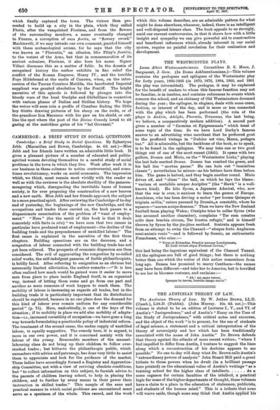THE WESTMINSTER PLAYS.
Luaus Alteri Westmonasteriensis. Curantibus R. S. Mitre, J. Sargeaunt, J. Gow. (In Domo Ashburnhamiana.)—This volume contains the prologues and epilogues of the Westminster play for forty years, 1866-1906 (in 1870, 1876, 1884, 1900, and 1901 the play was intermitted). The prologue, it may be explained for the benefit of readers to whom this famous fraction may not be familiar, is in iambics, and contains references to events which concern the school, and an obituary of Old Westmiusters deceased during the year ; the epilogue, in elegiacs, deals with some craze, fashion, or interest of the day, and is more or less connected with the play which has been performed (the rota of the plays is Andria, Adelphi, Phormio, Trinumus, the last being, we believe, a comparatively modern addition). A second part gives a number of "Carmine et Epigrammata" which treat of some topic of the time. So we have Lord Derby's famous answer to an advertising wine merchant that he preferred gout to the proffered vintage in "Dulcior est vino, Marce, podagra two." All is admirable, but the backbone of the book, so to speak, is to be found in the epilogues. We may take one or two good things out of one of the most recent (1905). It opens with two golfers, Domes and Micio, on the " Westminster Links," playing the last hole marked Domus. Domes. has reached the green, and his ball lies " mortua paene." He can hole out " luminibus clausis "; nevertheless he misses—as his betters have done before him. The game is halved, and they begin another round. Micio drives off, and " slices " the ball, on which he lays the blame: " varium et mutabile semper Accipiter " (the "Hawk" is a well- known kind). He hits Syrus, a Japanese Admiral, who, now that the war is over, is anxious to learn the games of Europe. Aeschinus, who has been driving a motor "per horam Quinque et triginta millia," enters pursued by DromioAa constable, whom he squares—'taurum accipe densum." Then we have the New Zealand football team playing Wales ; Ctesipho tries to collar Syrus (who has assumed another character), complains " Ter sum conatus cello dare brachia circum, Ter frustra refugia," and is himself thrown by Syrtis by the jiu-jitsu method. Sostrata appears fresh from an attempt to swim the Channel—" absque freto Anglorum semi-animis venio"—and is followed by Bennie, an enthusiastio Frenchman, who cries :—
Vivat et Edvard., Praetor quoque Londinieneim.
Et Ludi vivant atque Fretenee Carom,-
this last being the ingenious equivalent of the Channel Tunnel. All the epilogues are full of good things ; but there is nothing better than one which the writer of this notice remembers from long ago. Demea has promised to marry Canthara—the names may have been different—and take her to America, but is horrified to see her in bloomer costume, and exclaims:—
" ah I me mare terret,
Ipeacitte to terree, horride imago mania."


























































 Previous page
Previous page